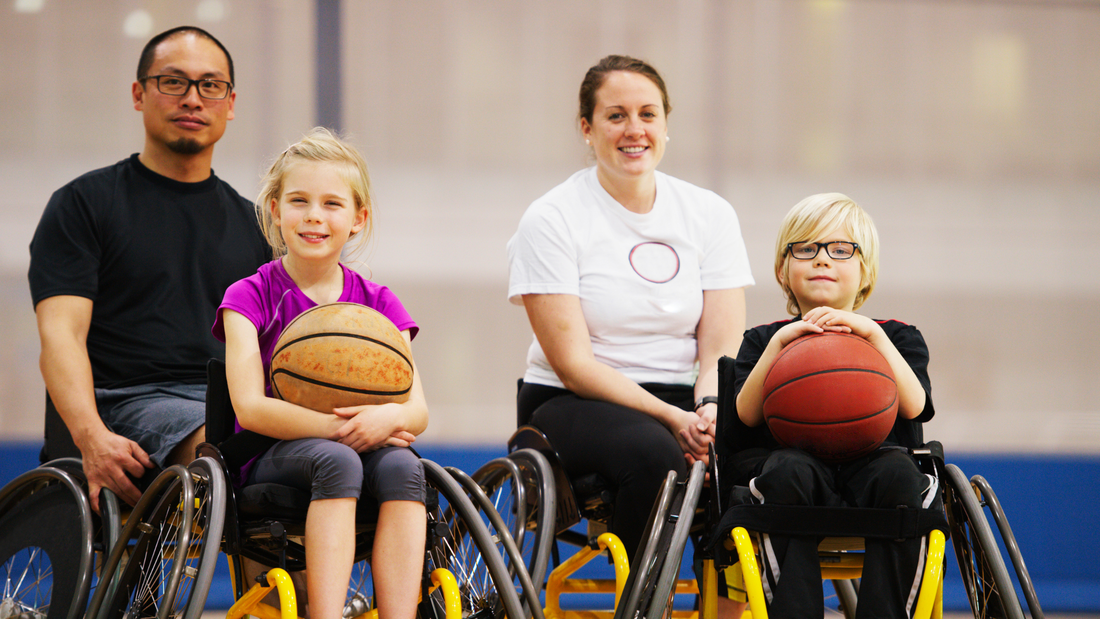|
Experts recommend that children and teens get at least 60 minutes of physical activity every day, and this rings true for children with disabilities as well. However, when a child is differently-abled, encouragement for regular exercise may fall to the wayside due to their perceived physical limitations.
Numerous studies show that children with disabilities often have lower levels of physical fitness, but there are plenty of ways to change this narrative. There is no shortage of physical activities appropriate for children with disabilities, especially when implemented with help from adaptive fitness specialists. Want to learn more? Let’s get started! What Are Good Physical Activities for Children with Disabilities? While physical activity benefits all children, differently-abled children often have lower cardiovascular fitness and muscular endurance levels, which coincides with greater levels of deconditioning and obesity. Although some parents or guardians may discourage children with disabilities from engaging in physical activities, it's a vital component of healthy development. Any child can get in shape with guidance and support! Physical activities for children with disabilities are often similar to those for any other child, requiring just a few accommodations. For instance, the following sports and activities are ideal for children with special needs:
While some activities don't require any changes, others may need a few accommodations to ensure your child can fully participate. Regardless of your child's chosen activity, it's essential to seek the assistance of adaptive fitness specialists who understand your child's special needs. What Obstacles Do Children with Diverse Abilities Face? Although no one should feel limited by their physical or mental ability, children with diverse abilities often harbor feelings of inadequacy and feel excluded from social interactions with their peers. Differently-abled children often experience barriers, including the following:
Physical activities for children with disabilities come with benefits such as improved lung capacity, increased muscle strength, and better cardiovascular health, just as for everyone else. However, an adaptive fitness regime also has benefits that span beyond the physical body, such as the following. 1. They Increase Self-Esteem When differently-abled children grow up in a society where they are underrepresented, it can be a blow to their self-esteem. However, as children learn that their diverse abilities are valuable and strengthen their social support systems, they can develop a much more positive self-concept that will serve them well in adulthood. Studies show that differently-abled individuals who start sports at an early age and continue for many years have much higher self-esteem than those who do not. Playing an adaptive sport instills differently-abled children with a sense of accomplishment and belonging. Moreover, their improved self-esteem will spill over into other areas of their lives for a healthier, happier lifestyle. 2. They Promote Inclusion and Relationship Development Sometimes, differently-abled people feel left out, especially at school. They often find it challenging to "fit in" with peers and make genuine friendships. Fortunately, when children with disabilities partake in adaptive fitness activities with others, they can connect with their peers in a fun, exciting environment. This way, children with disabilities feel included, just like their classmates. Everyone needs a few friends, but it can be incredibly challenging for children with disabilities to have a healthy social life. However, encouraging your child to participate in adaptive fitness with others is a great way to foster a sense of community, which is essential to their well-being. 3. They Improve Quality of Life You're probably aware that exercise comes with myriad health benefits, but for differently-abled children, these health benefits can alter the course of their lives for the better. Physical activities for children with disabilities enhance cognition, help them manage their weight, strengthen their bodies, and improve their ability to perform everyday activities. Sometimes, differently-abled children struggle with mental health difficulties, but a regular exercise routine can also diminish symptoms of depression and anxiety. The release of endorphins from regular exercise reduces depressive symptoms. Furthermore, regular exercise provides a healthy way to alleviate any tension or stress your child may be experiencing. How to Introduce Fitness for Children with Disabilities When your child has special needs, it can be challenging to find physical activities for them to participate in. However, there are plenty of ways to help your child get involved. These simple tips will help you get started! 1. Begin Early It's never too late for your child to get involved in adaptive fitness, but the sooner, the better! Ideally, you'll have the opportunity to get your child involved in sports when they begin branching out from individual play. An early start will also ensure that your child builds healthy habits and high self-esteem from a young age. 2. De-Medicalize Sports Physical activities for children with disabilities often occur in clinical settings, such as physical and occupational therapy. Adaptive fitness is an opportunity to show your child that it’s fun to lead a healthy lifestyle, especially when you’re surrounded by friends! Whether your child chooses to participate in a sport or take up fitness activities like weightlifting, exercising in a fun setting teaches children with diverse abilities how to move their bodies safely, and these skills will stay with them in adulthood. 3. Get Help from Adaptive Fitness Specialists Before your child partakes in any sport, ensure that you're working with adaptive fitness specialists that have experience with special needs children. Specialists familiar with differently-abled children will allow you and your child to easily navigate any challenges that arise. Adaptive fitness experts understand how to offer accommodations, modifications, structure, and even de-escalate tense situations so your child can focus on getting fit and having fun. Consider seeking help from an adaptive fitness specialist and work with them to create a customized fitness program for your child's special needs. Make the Most of Your Diverse Abilities with Let's Go Fitness! At Let's Go Fitness, we strive to create a welcoming environment where everyone can make friends, get in shape, and have fun doing it! Our adaptive fitness specialists guide our athletes every step of the way. Whether your child needs accommodations, modifications, or simply an understanding listener, we'll help them reach their goals. Are you ready to get started on this fitness journey? Contact Let's Go Fitness today to learn more about our membership packages!
0 Comments
Leave a Reply. |
ABOUTLet's Go Fitness's blog page keeps you up to date with educational and instructional information for training with diverse abilities. Archives
June 2023
Categories |
Let's Go Fitness
© 2020 Let's Go Fitness is an online fitness platform for people of all abilities.


 RSS Feed
RSS Feed